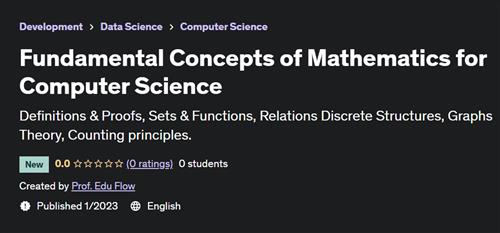
Published 1/2023
Created by Prof. Edu Flow
MP4 | Video: h264, 1280x720 | Audio: AAC, 44.1 KHz, 2 Ch
Genre: eLearning | Language: English | Duration: 12 Lectures ( 1h 52m ) | Size: 376 MB
Definitions & Proofs, Sets & Functions, Relations Discrete Structures, Graphs Theory, Counting principles.
What you'll learn
Doing the problem sets is for most students, the best way to master the course material. Problem sets will count for up to 30% of the final grade.
Use logical notation to define and reason about fundamental mathematical concepts such as sets, relations, functions, and integers.
Fundamental Concepts of Mathematics: Definitions, Proofs, Sets, Functions, Relations, Discrete Structures, Modular Arithmetic, Graphs, State machines, Counting
Discrete Mathematics principles of discrete probability to calculate probabilities and expectations of simple random processes.
Mathematically about basic data types and structures (such as numbers, sets, graphs, and trees) used in computer algorithms and systems).
Apply graph theory models of data structures and state machines to solve discrete math of connectivity and constraint satisfaction, for example, scheduling.
Evaluate elementary mathematical arguments and identify fallacious reasoning (not just fallacious conclusions).
Requirements
No computer programming experience needed. You should be familiar with sequences and series, limits, and integration and differentiation of univariate functions.
Description
In this course, students will learn the fundamental principles of discrete mathematics as they relate to computer science. Discrete mathematics is a branch of mathematics that deals with discrete, rather than continuous, objects. It is an essential tool in computer science, as it provides the mathematical foundations for the design and analysis of algorithms, software engineering, and computer systems.Upon completing the course, students will be able to understand and apply the basic methods of discrete mathematics, including set theory, logic, combinatorics, and graph theory. These methods will enable them to analyze and solve problems related to the design and analysis of algorithms, as well as the development and operation of software and computer systems.In addition to acquiring a strong foundation in discrete mathematics, students will also develop skills in problem-solving and critical thinking, which are crucial for success in computer science and other fields. By learning to think logically and systematically, students will be better prepared to tackle complex challenges and make informed decisions in their future careers.In particular, students will be able to:Reason mathematically about basic data types and structures (such as numbers, sets, graphs, and trees) used in computer algorithms and systems; distinguish rigorous definitions and conclusions from merely plausible ones; synthesize elementary proofs, especially proofs by induction.Model and analyze computational processes using analytic and combinatorial methods.Apply principles of discrete probability to calculate probabilities and expectations of simple random processes.
Who this course is for
This is an introductory course in Mathematics oriented toward Computer Science
Homepage
https://www.udemy.com/course/fundamental-concepts-of-mathematics-for-computer-science/1DL
tgfzp.Fundamental.Concepts.of.Mathematics.for.Computer.Science.rar
Rapidgator
DOWNLOAD FROM RAPIDGATOR.NET
Uploadgig
DOWNLOAD FROM UPLOADGIG.COM
NitroFlare
DOWNLOAD FROM NITROFLARE.COM
Please Help Me Click Connect Icon Below Here and Share News to Social Network | Thanks you !

